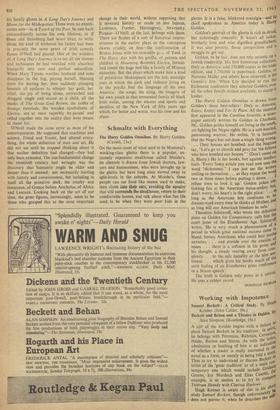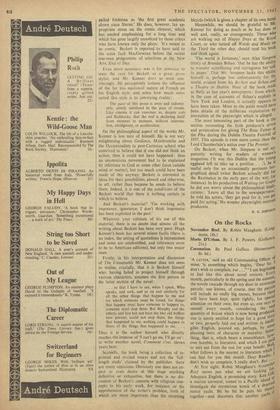Working with Impotence
Samuel Beckett : A Critical Study. BY Hugh Kenner. (John Calder, 30s.)
Beckett and Behan and a Theatre in Dublin. BY Alan Simpson. (Routledge, I8s.)
A LQT of the trouble begins with a failure. place Samuel Beckett in his tradition: in spill" he belongs with Petronius, Rabelais, Cervantes' Nashe, Burton and Sterne. As with the latter! admiration or loathing of him is an indication e of whether a reader is really interested in the novel as a form, or merely in being told a story Thus to try to understand or discuss Beckett t; terms of the 'great tradition' or of a main 00_, temporary one which would include Gralla17 Greene, Iris Murdoch and Elias Canetti, Ore example, is as useless as to try to c0111133 Tristram Shandy with Clarissa Marlowe. Hugh Kenner is aware of this in his shod study Samuel Beckett, though unfortunately a. does not pursue it, when he describes the se'
exiled Irishman as 'the first great academic clown since Sterne.' He does, however, lay ap- propriate stress on the comic element, which has needed emphasising for a long time and which has gone largely unnoticed by those critics who have known only the plays: 'It's meant to be comic,' Beckett is reported to have said to the actor Jack MacGowran before the recent one-man programme of selections at the New Arts. End of Day.
Even more necessary was it for someone to state the case for Beckett as a great prose stylist, and Mr. Kenner does so most con. vincingly. He perceptively isolates the influence of the far less equivocal nature of French on his English style, and notes how much more suited this style is to conveying reality: The pace of this prose is even and indomit• able. utterly unrelated to the pace of events. Like cinema it can convince us, despite cuts and flashbacks, that the real is declaring itself from moment to moment, without interven- tion, abridgment, or acceleration.
On the philosophical aspect of the works Mr. Kenner is less sure of himself. He is not very enlightening about Geulincx, Malebranche and the Occasionalists (a post-Cartesian school who contrived to believe that if one did not think an action, then it could not have happened: thus an unconscious movement had to be explained by reference to God or some other force outside mind or matter), but too much could have been made of this anyway. Beckett is interested in ideas for their possibilities, absurd and otherwise, in art, rather than because he needs to believe them. Indeed, it is one of the conditions of the Beckett world that there is nothing certain in which to believe.
And Beckett's material? 'I'm working with impotence, ignorance. I don't think impotence has been exploited in the past.'
Whatever your estimate of his use of this material, there is no doubt that almost all the writing about Beckett has been very poor. Hugh Kenner's book has several minor faults (there is no index, the setting of quotations is inconsistent and some are unidentified, and references seem to be to American editions), but only two major ones.
Firstly, in his interpretation and discussion of The Unnamable Mr. Kenner does not seem to realise, crucially, that it is Beckett himself who, having failed to project himself through various characters, assumes the first person in the latter section of the novel:
. . so that I have to say, when I speak, Who speaks, and seek, and so on and similarly for all the other things that happen to me and for which someone must be found, for things that happen must have someone to happen to, someone must stop them. But Murphy and the others, and last but not least the two old buffers here present, could not stop them, the things that happened to me, nothing could happen to them, of the things that happened to me, . .
Thus it is the author himself who directly reaches the impasse of 'I can't go on, I'll go on': to write another novel, Comment c'est, eleven years later.
Secondly, the book being a collection of re- printed and revised essays and not the 'full- length study' claimed by the publisher, there are many omissions. Obviously one does not ex- pect or even desire at this stage anything definitive or exhaustive, but there is no dis- cussion of Beckett's concern with religious con- cepts in his early work, for instance, or his apprehension of the writer's problem, both of which are more important than the recurring bicycle (which is given a chapter of its own here). Meanwhile, we should be grateful to Mr. Kenner for doing as much as he has done so well and, really, so courageously. Those who are walking out of Happy Days at the Royal Court, or who turned off Words and Music 00 the Third the other day, should read his book and think again. 'The world is fortunate,' says Alan Simpson tritely of .Brendan Behan. 'that he has the ability to transfer scintillating and outrageous bar talk to paper.' That Mr. Simpson lacks this ability himself is, perhaps less unfortunately for the world, evident from his Beckett and Behan and a Theatre in Dublin. Most of the book reads as flatly as last year's newspapers: from which, in the case of accounts of Behan's exploits in New York and London, it actually appears to have been taken. More to the point would have been details of the deliberate exploitation by journalists of the playwright" which is alleged.
The most interesting part of the book is the section recounting the Irish producer's arrest and prosecution for giving The Rose Tattoo at the Pike during the Dublin Theatre Festival of 1957. This episode is even more comic than the Lord Chamberlain's antics over The Premise.
On Beckett, when Mr. Simpson is not ap- parently writing for readers of womens magazines ('It was this Dublin that the young egghead left to take up a position . . he is useful only for an occasionally pertinent bio- graphical detail (what Beckett actually did for the Resistance in the early part of the war, for instance). In his production of Waiting for Godot he did not worry about the philosophical cations: 'Leave all that to the newspapermen, he told his actors, 'they get paid for it, you get paid for acting.' No wonder playwrights mistrust producers. B. S. JOHNSON











































































 Previous page
Previous page